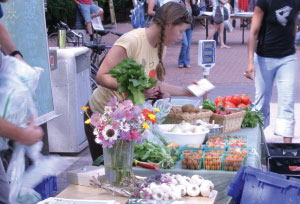Growing more organic farmers: the Pioneers of Organic Agriculture scholarship
by Daniel J. Bernardo
This article was originally published in December 2008

I’m writing to invite you to join Washington State University (WSU) in growing a new generation of pioneers in organic agriculture.
Why you? Because I know PCC members and shoppers share a vision for a farming and food system that embraces sustainability from the seed to the table. It’s the reason you take special care to invest your food dollars in ways that are part of the solution.
Now, there’s another way you can invest in the growth of organics — by contributing to WSU’s “Pioneers of Organic Agriculture” Scholarship Fund. It was established to provide financial support to students enrolled in the organic farming major at WSU.
Down with dirt
As Phoenix native and WSU undergraduate Haley Paul said, “Working on the organic farm was the experience of a lifetime.” Haley found that studying organic agriculture at WSU complemented perfectly her interest in farming systems in developing countries. Haley, an honors college student, is a future pioneer.
“Especially coming from the city,” Haley said, “seeing a carrot grow from a seed to something I could pull out of the ground and eat really gave me a new appreciation of where my food comes from.”
In 2006, WSU received international media attention by becoming the first university in the United States to offer a major in organic agriculture.
The major builds on 30 years of research in sustainable agriculture at WSU. This body of knowledge includes improving soil fertility, fighting pests, and choosing the best plant varieties. These are valuable tools for sustainability, for both certified organic and non-organic farmers. WSU supports sustainable agriculture across Washington state at our research and extension centers — the Tukey Organic Teaching Farm in Pullman, and the Small Farms Program that helps create jobs and markets for sustainable products in local markets.
With support from WSU, our state’s growers, food processors and retailers have created one of the most sophisticated and fastest-growing organic sectors in the nation. Annual sales here are $300 million and growing.
This is why I’m reaching out to members of PCC Natural Markets; you are the nation’s largest natural foods cooperative retailer. Your support in developing our organic program will help us grow organics across Washington and the nation.
Keeping organic education sustainable
The Pioneers of Organic Agriculture Scholarship Fund was established to provide financial support to students enrolled in the organic farming major at WSU. The annual cost of attendance, including tuition, room and board, and other expenses, is now more than $20,500 at the Pullman campus. Students are much more likely to choose the organic farming major if they have financial support to complete their studies.
Just as our food must be produced sustainably, education also must be kept sustainable. Your tax-deductible contribution will help educate and sustain new leaders in the areas where we need them most.
Your support will keep students motivated and demonstrate that there’s a community of consumers standing behind them.
Your investment in these students is a powerful vote for the future of organics.
Donors can make their contribution in honor of a favorite organic farmer, gardener or researcher. When you provide the name and address of the individual you’d like to recognize, we’ll send a card to that person acknowledging your contribution.
Please send your gift today and help us grow a new generation of pioneers in organic farming.
Dan Bernardo is an agricultural economist and dean of WSU’s College of Agricultural, Human, and Natural Resource Sciences since 2005.
